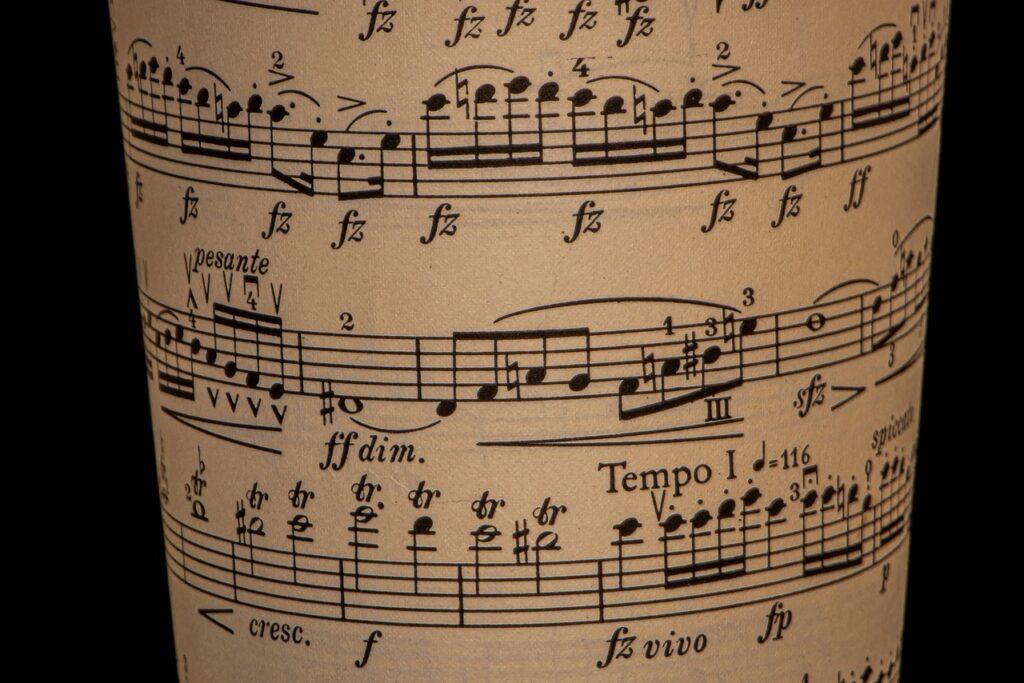Estimated reading time 3 minutes
Table of Contents
Introduction
Does playing a different dynamic in each hand on piano seem like it’d be impossible to do? Would you like help figuring out how it works? A lot of people have trouble playing a different dynamic in each hand. However, the trick is to treat as them connected – not as separate dynamics. Read more to learn the tips for playing a different dynamic in each hand on piano.
Unlike the other posts in the Interpretation Series, we won’t start with focusing on interpretation.
- First, we’ll deal with playing a different dynamic in each hand.
- Then, I’ll give you tips for interpreting dynamics.
This article uses musical terms. For definitions, see the Glossary at the end of the post.

Tips for Playing a Different Dynamic in Each Hand on Piano: How It Works
First, how do you define the term dynamics? Dynamic signs tell you how soft or loud to play:
- ff = fortissimo = very loud
- f = forte = loud
- mf = mezzo forte = medium loud
- mp = mezzo piano = medium soft
- p = piano = soft
- pp = pianissimo = very soft
However, trying to (for example) play forte with the right hand and mezzo forte with the left hand can be very difficult. Why? Because it makes you think of the two hands separately.
Here’s some tips for playing a different dynamic in each hand on piano:
- I tell students, “Play f with the right hand and balance the left hand against the right.”
- That means you need to listen to the sound of both hands playing together.
- This way you can find a good balance between the hands with the right louder and the left softer (or vice versa).
- The emphasis should be on achieving a good overall hands-combined tone.
After all, there are no absolute dynamics.
- You can point to a key, and call it C.
- Also, you can clap a rhythm, and say it’s on beats 1 and 3.
- However, you can’t play a note and expect to reproduce the exact same decibel level every time.
- A lot of it centers on contrast, making your louds loud and softs soft.
Therefore, there’ll be a lot more personal interpretation with the dynamics than with other aspects of music. That’s where a lot of the artistry comes in.
Tips for Playing a Different Dynamic in Each Hand on Piano: Interpreting Dynamics
The following won’t be tips for playing a different dynamic in each hand on piano but rather general interpretation strategies. Like we saw in the other interpretation posts, interpreting dynamics relies on your imagination skills.
William Sherman talks about how he visualizes his dynamics:
Begin the first measure very softly, the second a trifle louder, the third louder still, the fourth falling off again. As you stand on the shore and watch the great waves coming in, you see some that are higher and larger than others, so it is here.
The concluding passage in sixths should diminish – like a little puff of vapor that ends in – nothing…
The beginning of the sixth page is very piano and light – it is nothing more than a breath of smoke, an airy nothing. (Piano Mastery: The Harriette Brower Interviews 74 – 76)
Using your imagination will be the key to playing with feeling – by creating stories for your music.

Tips for Playing a Different Dynamic in Each Hand on Piano: Teaching Dynamics to Kids
Well, that gives you some tips for playing a different dynamic in each hand on piano plus some ideas for interpreting dynamics.
I’ll leave you with a tip on how to use visual aids to help teach dynamics to kids:
- A few years ago, I had an adult student who said that her school music teacher used two puppets to teach dynamics.
- A lion puppet represented forte, and a kitten puppet represented piano.
- To this, I added a cat puppet to represent mezzo forte.
- You’ll help young children to immediately get dynamics if you teach using concrete examples.
Have fun playing!
Related Posts
- What Does it Mean for Me to Interpret a Piece of Music? Part 1
- What Do People Mean by the Term Interpretation in Classical Music? Part 2
- Why is Classical Music Interpreted Differently from Pop Music? Part 3
- Help Me! How Do I Improve My Touch on Piano? Part 4
© 2023 Geoffrey Keith
Join me for in-person or online lessons today!
Back to the All-Purpose Music Tips and Topics category blogs page
Glossary
What Is an Adverb? Learn About Amazing, Adaptable Adverbs
Do you want to know how adverbs work? They are amazingly versatile words that can impact many parts of speech within a sentence. It’s critical that writers, songwriters, and poets know how to use them. Keep reading “What Is an Adverb? Learn About Amazing, Adaptable Adverbs” to find out what they are and how they work. Estimated reading time 2 minutes.
Read MoreHow to Color Code Musical Diagrams
Do you get confused by musical diagrams? Do you want to learn how to turbocharge the learning process? Look no further, I can help. Read more to learn about color coding musical diagrams. Estimated reading time 5 minutes.
Read MoreBrainstorming Your Song Titles
Are you stuck in a rut like the guy in the picture above? Do you want to know how to come up with vivid and memorable titles? Most of the songwriting experts agree that you should first write your hook, which often ends up being paired with your title. This means you need your title at the beginning of the songwriting process. Read more to learn how to go about brainstorming your song titles. Estimated reading time 4 minutes.
Read MoreSinging Rhythm Syllables in 3-4 Time
Have you gotten the hang of reading rhythm in 4-4 time and want to get a handle on 3-4 time too? 3-4 has a much different feel than 4-4 and expands the types of music you can perform. Read more to learn about singing rhythm syllables in 3-4 time. Estimated reading time 3 minutes.
Read More




